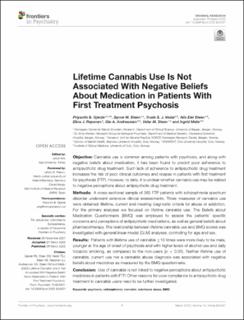| dc.contributor.author | Gjerde, Priyanthi Borgen | |
| dc.contributor.author | Steen, Synne Wollen | |
| dc.contributor.author | Vedal, Trude Seselie Jahr | |
| dc.contributor.author | Steen, Nils Eiel | |
| dc.contributor.author | Reponen, Elina Johanna | |
| dc.contributor.author | Andreassen, Ole | |
| dc.contributor.author | Steen, Vidar Martin | |
| dc.contributor.author | Melle, Ingrid | |
| dc.date.accessioned | 2022-08-01T14:18:56Z | |
| dc.date.available | 2022-08-01T14:18:56Z | |
| dc.date.created | 2022-06-02T09:42:24Z | |
| dc.date.issued | 2022 | |
| dc.identifier.issn | 1664-0640 | |
| dc.identifier.uri | https://hdl.handle.net/11250/3009659 | |
| dc.description.abstract | Objective: Cannabis use is common among patients with psychosis, and along with negative beliefs about medication, it has been found to predict poor adherence to antipsychotic drug treatment. Such lack of adherence to antipsychotic drug treatment increases the risk of poor clinical outcomes and relapse in patients with first treatment for psychosis (FTP). However, to date, it is unclear whether cannabis use may be related to negative perceptions about antipsychotic drug treatment.
Methods: A cross-sectional sample of 265 FTP patients with schizophrenia spectrum disorder underwent extensive clinical assessments. Three measures of cannabis use were obtained: lifetime, current and meeting diagnostic criteria for abuse or addiction. For the primary analyses we focused on lifetime cannabis use. The Beliefs about Medication Questionnaire (BMQ) was employed to assess the patients' specific concerns and perceptions of antipsychotic medications, as well as general beliefs about pharmacotherapy. The relationship between lifetime cannabis use and BMQ scores was investigated with general linear model (GLM) analyses, controlling for age and sex.
Results: Patients with lifetime use of cannabis ≥10 times were more likely to be male, younger at the age of onset of psychosis and with higher levels of alcohol use and daily tobacco smoking, as compared to the non-users (p < 0.05). Neither lifetime use of cannabis, current use nor a cannabis abuse diagnosis was associated with negative beliefs about medicines as measured by the BMQ questionnaire.
Conclusion: Use of cannabis is not linked to negative perceptions about antipsychotic medicines in patients with FTP. Other reasons for poor compliance to antipsychotic drug treatment in cannabis users need to be further investigated. | en_US |
| dc.language.iso | eng | en_US |
| dc.publisher | Frontiers | en_US |
| dc.rights | Navngivelse 4.0 Internasjonal | * |
| dc.rights.uri | http://creativecommons.org/licenses/by/4.0/deed.no | * |
| dc.title | Lifetime Cannabis Use Is Not Associated With Negative Beliefs About Medication in Patients With First Treatment Psychosis | en_US |
| dc.type | Journal article | en_US |
| dc.type | Peer reviewed | en_US |
| dc.description.version | publishedVersion | en_US |
| dc.rights.holder | Copyright 2022 The Author(s) | en_US |
| cristin.ispublished | true | |
| cristin.fulltext | original | |
| cristin.qualitycode | 1 | |
| dc.identifier.doi | 10.3389/fpsyt.2022.824051 | |
| dc.identifier.cristin | 2028936 | |
| dc.source.journal | Frontiers in Psychiatry | en_US |
| dc.source.pagenumber | 824051 | en_US |
| dc.identifier.citation | Frontiers in Psychiatry. 2022, 13, 824051. | en_US |
| dc.source.volume | 13 | en_US |

